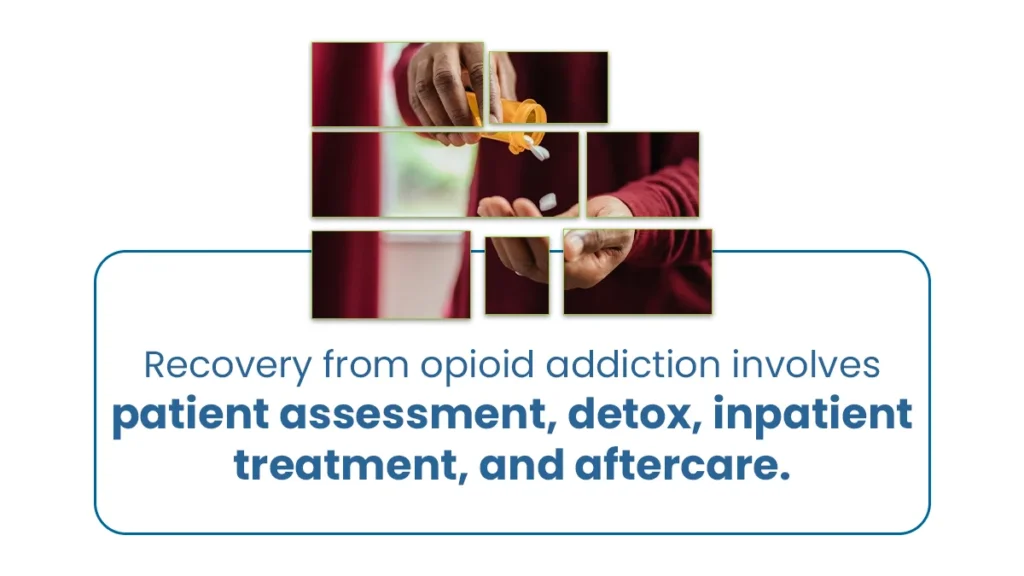Opioid addiction is a complex and challenging issue affecting individuals across the United States. To address this crisis, Medication-Assisted Treatment (MAT) has emerged as a widely recognized approach for opioid addiction recovery.

Buprenorphine is a partial opioid agonist, Methadone is a full opioid agonist, and naltrexone is an opioid antagonist. MAT, combined with counseling and support, offers a complete approach to help people regain control of their lives and recover from opioid addiction.
This article will compare three common medications used in MAT: Buprenorphine, Methadone, and Naltrexone. Each drug works differently to alleviate withdrawal symptoms, reduce cravings, and prevent relapse. Read on to learn more.
Key Takeaways
Opioid addiction is a severe condition that affects people across the United States.
- Opioid addiction is a widespread crisis affecting individuals across the United States.
- Medication-Assisted Treatment (MAT) combined with counseling and support is a practical approach to opioid addiction recovery.
- Recovery from opioid addiction involves assessment, detox, inpatient treatment, and aftercare.
The Haven Detox-Little Rock offers support for those seeking opioid addiction recovery. Contact us at (501) 271-3342 and get effective medical care.
Understanding Opioid Addiction
Opioid addiction is a severe condition that affects people across the United States. It occurs when individuals become dependent on opioids, which are powerful pain-relieving medications. Opioids can include prescription painkillers like oxycodone and hydrocodone and illicit drugs like heroin.
When a person takes opioids, these drugs bind to specific receptors in the brain, choking pain signals and producing feelings of euphoria. However, continued use can lead to physical and psychological dependence.
Over time, individuals may need higher doses to achieve the same effect, leading to a dangerous cycle of drug-seeking behavior.
Opioid overdose can devastate a person’s health, relationships, and overall well-being. It can lead to respiratory problems, organ damage, infectious diseases, and mental health disorders. The withdrawal symptoms experienced when attempting to quit opioids can be intense and uncomfortable, making it challenging to break free from addiction.
Fortunately, effective treatments for opioid addiction exist. Medication-Assisted Treatment (MAT) combines buprenorphine, Methadone, or Naltrexone with counseling and behavioral therapies. These medications help reduce cravings, manage withdrawal symptoms, and prevent relapse.
It is important to remember that opioid addiction is a medical condition and not a moral failing. By raising awareness and fostering understanding, we can work towards creating a society that supports and empowers those affected by this widespread issue.
Opioid Addiction Crisis
Opioid addiction has become a significant crisis affecting individuals across the United States. Opioids are powerful pain-relieving medications, including prescription painkillers like oxycodone and hydrocodone and illicit drugs like heroin. The widespread misuse of opioids has led to a surge in addiction cases and devastating consequences.
Various opioids have different effects on the body. Prescription opioids are often prescribed to manage severe pain, but they can also produce feelings of euphoria. Common prescription opioids include OxyContin, Percocet, and Vicodin. Illicit opioids, such as heroin, are highly addictive and can lead to various health problems.
Risk Factors for Opioid Addiction
Several risk factors contribute to the development of opioid addiction. These include a history of substance abuse, a family history of addiction, mental health disorders, easy access to opioids, and a history of trauma or abuse. In addition to the information, people who misuse prescription opioids or take higher doses than prescribed are at an increased risk of addiction.
Signs and Symptoms of Opioid Addiction
Recognizing the signs and symptoms of opioid addiction is crucial for early intervention. Common signs include:
- Persistent cravings for opioids
- Increased tolerance
- Withdrawal symptoms when attempting to quit
- Neglecting responsibilities
- Social withdrawal
- Changes in behavior and appearance
- Financial difficulties.
If you or someone exhibits these signs, it may indicate a problem with opioid addiction. It is vital to address the opioid addiction crisis through comprehensive approaches.
Medication-Assisted Treatment (MAT) combined with counseling and support has shown effectiveness in helping individuals overcome opioid addiction. We can work together to combat this crisis and support those affected by opioid addiction.
Opioid Addiction Recovery Process
Recovering from opioid addiction is a journey that involves several necessary steps. This process aims to help individuals overcome addiction, regain control of their lives, and win lasting recovery. Here are four main components of the opioid addiction recovery process:
Assessment
The first step in recovery is a thorough assessment conducted by healthcare professionals. It involves evaluating the individual’s physical and mental illness, substance use history, and any co-occurring disorders.
The assessment helps determine the most appropriate treatment approach for the individual. It helps in processing the fast recovery.
Detox
Detoxification, or detox, is removing opioids from the body. It typically involves managing withdrawal symptoms under medical supervision.
People may use medications to ease discomfort and ensure a safe detoxification process. Detox helps individuals rid their bodies of opioids and prepares them for further treatment.
Inpatient Treatment
Inpatient or residential treatment involves staying at a specialized facility where individuals receive intensive care and support. It includes individual and group therapy, educational sessions, and developing coping skills to prevent relapse. Inpatient treatment provides a structured and supportive environment for individuals to focus on their recovery.
Aftercare
After inpatient treatment, individuals transition to aftercare programs, which provide ongoing support and guidance. Aftercare may include outpatient therapy, support groups, relapse prevention strategies, and continued medication-assisted treatment. These resources help individuals maintain their recovery and navigate the challenges of daily life without opioids.
The opioid addiction recovery process requires commitment, support, and a comprehensive approach. Individuals can grow their chances of achieving long-term recovery and building a healthier, drug-free life by engaging in assessment, detox, inpatient treatment, and aftercare.
Medication-Assisted Treatment
Medication-Assisted Treatment (MAT) is a widely recognized approach to opioid addiction recovery. Here are some commonly used medications in MAT and their pros and cons:
Methadone
Methadone helps reduce cravings and withdrawal symptoms, allowing individuals to stabilize their lives and engage in treatment. It is dispensed through specialized clinics and provides long-lasting effects, minimizing the risk of relapse.
Cons methadone requires daily clinic visits for medication administration, which can be challenging for some individuals. It can also cause side effects, including drowsiness and constipation. Methadone is an opioid that risks misuse or dependence if not taken as prescribed.
Buprenorphine
Pros are buprenorphine reduces cravings and withdrawal symptoms, helping individuals maintain stability and focus on recovery. It can be prescribed in various settings, including primary care offices, increasing accessibility. Buprenorphine has a lower risk of misuse and overdose compared to other opioids.
Cons are buprenorphine can cause side effects like nausea and constipation, although they are generally milder than with full opioids. It requires a prescription from a qualified healthcare provider, limiting availability. Some individuals may experience difficulty tapering off buprenorphine after long-term use.
Naltrexone
Naltrexone blocks the effects of opioids, reduces cravings, and prevents relapse. It is available in different forms, including oral tablets and extended-release injections. Naltrexone does not produce dependence or withdrawal symptoms.
However, it is most effective when individuals have already completed detoxification and achieved abstinence from opioids. It can cause side effects like nausea and headache. Compliance with naltrexone treatment is crucial, as missing doses can diminish effectiveness.
Naloxone
It is an emergency medication used to reverse opioid overdoses. It rapidly restores normal breathing and can save lives when administered in time.
Naloxone is primarily used for emergencies and does not treat the underlying addiction. It is essential to seek comprehensive treatment after naloxone administration to address the root causes of addiction.
MAT and counseling and support offer a comprehensive approach to opioid addiction recovery. The choice of medicine should be based on individual needs, preferences, and healthcare provider recommendations.
Impact of Opioid Addiction Recovery
Opioid abuse, often stemming from the misuse of prescription medication for pain relief, has become a significant concern for patients, doctors, and treatment centers. Substance use disorder related to opioid medications can be particularly challenging, especially for people managing chronic pain.
Opioid addiction recovery profoundly impacts individuals, families, and communities. Achieving recovery from opioid addiction brings about numerous positive changes.
It improves physical and mental health, restores relationships, and enhances the overall quality of life. Recovered individuals regain control over their lives, find purpose, and pursue their goals.
Families experience relief from the turmoil of addiction, fostering healing and rebuilding trust. Communities also benefit, with reduced crime rates, lower healthcare costs, and increased productivity.
Addressing opioid addiction requires treatment approaches that prioritize patient well-being and provide effective opioid addiction treatment.
Frequently Asked Questions (FAQ)
What is the antidote to opiate addiction?
The antidote to opiate addiction is a complete treatment, typically involving medication, counseling, and support. Medication-Assisted Treatment (MAT) is often used to manage cravings, reduce withdrawal symptoms, and prevent relapse.
However, it’s important to note that there is no single “magic pill” or instant cure for opiate addiction. Recovery requires a holistic approach tailored to individual needs.
What are the five steps of recovery from drug addiction?
The five steps of recovery from drug addiction typically include:
Acknowledgment: Recognizing the problem and accepting the need for change.
Detoxification: Removing the drugs from the body under medical supervision.
Therapy and Counseling: Engaging in individual and group therapy to address issues and develop coping skills.
Support: Building a solid support network, including friends, family members, and support groups.
Maintenance: Continuing with ongoing treatment, therapy, and help to sustain recovery.
What medication is best for withdrawal?
The choice of medication for withdrawal depends on the specific substance and individual circumstances. Medicines commonly used to manage withdrawal symptoms include Buprenorphine, Methadone, and Clonidine.
Buprenorphine and Methadone are often used for opioid withdrawal, while Clonidine may be used for managing withdrawal from other substances. However, it is vital to consult with a healthcare professional who can assess the individual’s situation and determine the most appropriate medication for withdrawal management.
Find Safe and Effective Treatment at The Haven Detox-Little Rock
If you or someone is ready to take the first step towards overcoming addiction, help is available. The Haven Detox-Little Rock is offering empathetic support and guidance.
Our experts are devoted to providing a safe and nurturing atmosphere for detoxification and recovery through various services and therapy programs. Remember, you don’t have to encounter addiction alone.
Contact us at (501) 271-3342 and start your journey towards a healthier, drug-free life. We are here to stand with you each step of the trip, and recovery is achievable.



